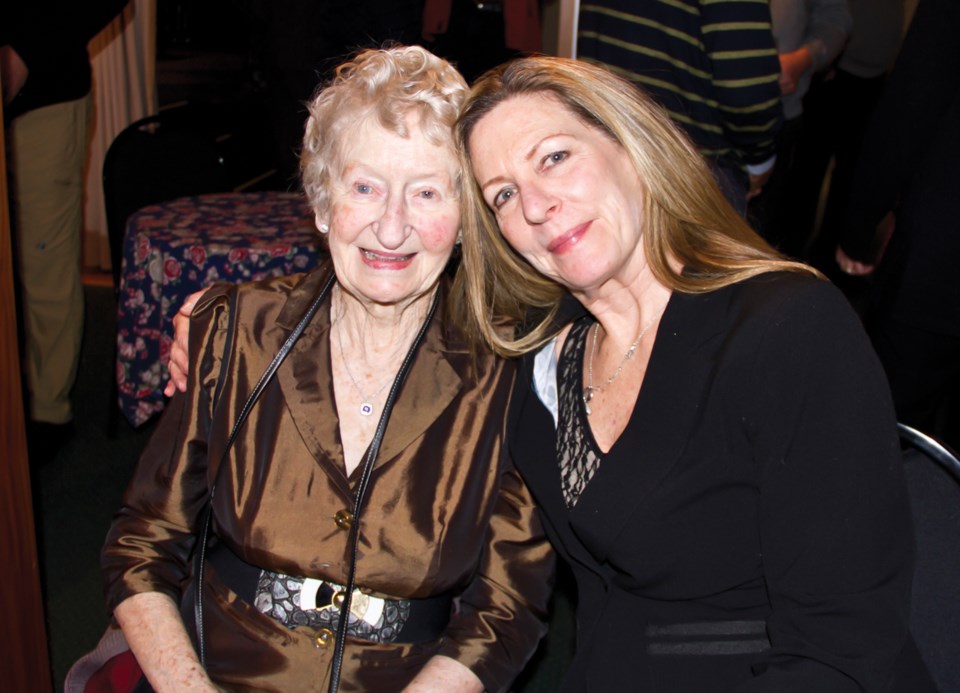Doreen Lee was in her early 30s when she moved from Vancouver to the relatively rugged Pender Harbour with her husband in 1958.
Early on, she was invited to tea. Still new to the place, she waited in her car to scope out what the women of Pender Harbour wore to such functions. “Of course, she was way overdressed,” recalled Dorothy Faulkner, co-author of Women of Pender Harbour and a close friend of Lee.
Lee compromised by removing her white gloves for the occasion, but that was it. Her style was here to stay.
And so it did for the next 60 years. But Doreen Lee was more than fashionable. She helped style some of Pender Harbour’s thriving community organizations – its library, its thrift store, its choir, not to mention supporting women’s groups and more.
“I think everything that happened in the Harbour had something to do with Doreen Lee,” said her friend, Margaret Skelley.
Lee, described by those who knew her as a modest and driven volunteer, died on April 25 at the age of 92.
Her foray into volunteerism began soon after settling into her home, built from logs harvested off their property, and enrolling her two daughters at Madeira Park Elementary School. Lee took a job as a secretary there, where she worked for more than a decade.
During that time she and her husband would welcome music lovers into their home, where they would play piano, clarinet, flute and other instruments. Those sessions were the genesis of the Pender Harbour Community Choir and Harbour Lights dance band. While Harbour Lights has faded, the choir, registered with the B.C. Choral Federation, continues performing and at 46 years old is the longest-running choral group on the Sunshine Coast.
Lee, a “beautiful” soprano singer according to Faulkner, encouraged and mentored the next generation of Pender Harbour performers by giving free lessons to youth and encouraging other local musicians to do the same.
She was also part of a group that worked to acquire a building now known as the Pender Harbour Performance Centre. “That’s how much they wanted music to thrive in Pender,” said her friend Nancy Mackay.
In 1987 Mackay became the chair and Lee the secretary of the Pender Harbour Music Society, which now operates a music school and organizes concert series and festivals that attract international talent. “That was huge, absolutely huge for this community,” Skelley said.
Lee retired from the choir in her late 80s, but she never stopped singing. Even during her final months at the Shorncliffe care facility, after she lost her ability to talk, she still could sing. “She had half of Shorncliffe singing with her,” her son-in-law Bob Fielding told Coast Reporter.
Music wasn’t Lee’s only focus. In 1966, she co-founded the Pender Harbour Reading Centre, collecting book donations door to door. The volunteer-run library service continues serving residents north of Halfmoon Bay.
In the late 1970s she founded a thrift store, now known as the Bargain Barn. Proceeds from sales support the Pender Harbour Health Centre.
Community was created in other ways, too. In 1963 Lee co-founded a professional women’s club and was an early supporter of Women’s Connections, another thriving women’s group co-founded 20 years ago by her friend Dorothy Faulkner to give newcomers a chance to integrate into the community and avoid the isolation that can creep into rural life.
Loneliness was something Lee confronted when she arrived in the 1950s. Her husband, a tugboat captain, would be away for weeks at a time. “She was on her own a lot in a new place, so she sensed what it was like,” Faulkner said.
By the time Women’s Connections came around, Lee was already a fixture in the community, but she would attend all the same. “Doreen was one of the first of the other women who didn’t need what we really needed. But she came and added so much. She added acceptance.”
In 2017, Lee was honoured with the Pender Harbour Area Community Volunteer Award for her lifetime of volunteering. And while she received more recognition for her public service near the end of her life, the rewards of her efforts were found elsewhere, according to Faulkner.
‘“Too much hoopla, what’s all this about?’ That’s what she’d say."



